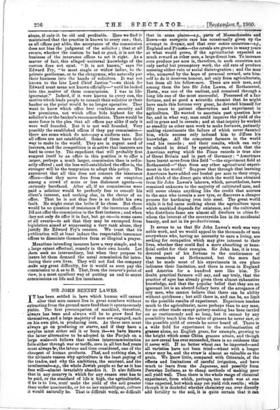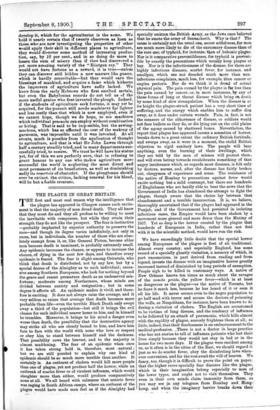SIR JOHN BENNET LAWES.
Ir has been settled in laws which human will cannot alter that men cannot live in great numbers without extracting from the ground more food than it spontaneously yields. The first preoccupation of mankind, therefore, always has been and always will be to grow food for themselves, and a large majority of men are engaged, each on his own plot, in producing corn. As these men must always go on producing or starve, and if they have a surplus must either sell it or burn its-e-we have known the latter alternative to be adopted in the Punjab on a large scale—it follows that unless intercommunication fails either through war or tariffs, corn in all but bad years must always be the labour and time considered, one of the cheapest of human products. Thai, and nothing else, is the ultimate reason why agriculture is the least paying of the trades, and why the ambitions, the esurient, and the intellectual—kg:, the whole Jewish people so far as it has free will—almost invariably abandon it. It also followa that in any Country in Which for any reason rent has to be paid, or the standard of life k high, the agriculturist, if he is to live, must make the yield of the soil greater than or let us say unintelligent, culture it Would naturally be. That is difficult work, so difficult that in some places—e.g., parts of Massachusetts and Essex—an energetic race has occasionally given up the attempt in despair, and that over entire countries—e.g., England and Prussia—the cereals are grown in many years at what would prove, if the agriculturist expected as much reward as other men, a large direct loss. To increase corn produce per acre is, therefore, in such countries not only useful but peremptory work, the old rate of produce meaning-either ruin or social disintegration ; and the man ' who, unmoved by the hope of personal reward, sets him- self to do it deserves honour, not only from agriculturists, but from all his fellow-men. There are such men, and among them the late Sir John Lawes, of Rothamsted, gerts., was one of the earliest, and remained through a long life one of the most successful. Possessed of a fair fortune, and so good a scientific chemist that he might have made this fortune very great, he devoted himself for fifty years to patient observation and experiment in - agriculture. He wanted to ascertain past question how - far, and in what way, man could improve the yield of the soil in grass and in cereals ; and at that inquiry he worked as steadily as other men work to make fortunes, patiently making experiments the failure of which never daunted him, while success only induced him to diffuse his knowledge. All the competent farmers in the world read his records ; and their results, which can only be related in detail by specialists, were such that the American saying which the Times records is true also of Great Britain and in part of Germany: "Americans have learnt more from this field "—the experiment field at Rothamsted -••4 than from any other agricultural experi- ment in the world." Suppose that through that learning Americans have added one bushel per acre to their crops, and think of the direct gain which the world has obtained from Sir John .Lawes's labours, which, nevertheless, have remained unknown to the majority of cultivated men, and will never obtain anything like the credit that accrues to the man who invents a new tyre, or discovers a cheaper process for hardening iron into steel. The great world while it is fed cares nothing about the agriculture upon which mankind depends for existence, and the cultivated who distribute fame are almost all dwellers in cities fo- whom the interest of the countryside lies in its accidental beauty, and not in its productiveness.
It seems to us that Sir John Lawes's work was very noble work, and we would appeal to the thousands of men everywhere who, having no necessity to earn a living, are seeking for occupation which may give interest to their lives, whether they could find a more absorbing or bene- ficial outlet for their energies. Sir John has, it is true, devoted part of his fortune to the continuance of his researches at Rothamsted, but the mere fact that he made most of his experiments in one place indicates their limitation, and there is room in England and America for a hundred men like him. No doubt practical farmers .will say, and say truly, that the practice of ages has already given them almost exhaustive knowledge, and that the popular belief that they are an ignorant lot is an absurd fallacy born of the arrogance of city men, who cannot believe that there can be ability without quickness ; but still there is, and can be, no limit to the possible results of experiment. Experience teaches much to the agriculturist, more perhaps than to any man, for no other trade except pottery-making has been carried on so continuously and so long, but it cannot by any possibility teach him the value of grasses he never saw, or the possible yield of cereals he never heard of. There is a wide field for experiment in the acclimatisation of grasses alone, no English grass, for example, growing to the height which some China grasses attain, and though no new cereal has ever succeeded, there is no evidence that it never will. If no better wheat can be imported—and all varieties have not been tried—wheat with a longer straw may be, and the straw is almost as valuable as the grain. We know little, compared with Orientals of the effects and limitations of careful irrigation, and -have much to learn from the Japanese, and possibly from Peruvian Indians, as to cheap methods of making poor soil yield well. Then there is the whole range of chemical experiment, from which, perhaps, too much was at one time expected, but which may yet yield rich results ; while though it is doubtful whether chemistry can ever directly add fertility to the soil, it is quite certain that it can develop it, which for the agriculturist is the same. We bold it nearly certain that if twenty observers as keen as those_who are now investigating the properties of ether would apply their skill in different places to agriculture, they would discover some method of increasing produc- tion, say, by 10 per cent., and in so doing do more to lessen the sum of misery than if they had discovered a yet more amazing, variety of the "Röntgen ray." They would not have fortune as a reward, it is true—unless they can discover still hidden a new manure like guano, which is hardly conceivable—but they would earn the blessings of mankind, and acquire a fame which hitherto the improvers of agriculture have sadly lacked. We know from the early Hebrews who first smelted metals, but even the Babylonian records do not tell us of the more useful genius who first invented the plough. Indeed, if the students of agriculture seek fortune, it may yet be acquired, for the pursuit still needs machinery 'far lighter and less costly than that which is now employed, even if we cannot hope, though we do hope, to see machines which individual peasants can employ without combination or hiring. That is said to be impossible, but the sewing- machine, which has so affected the cost of the making of garments, was impossible until it was invented. At all events, much is possible from the application of thought to agriculture, and that is what Sir John Lewes through half a century steadily tried, and in many departments suc- cessfully tried, to ensure. We trust he will have his statue yet, for of this we are perfectly sure, that in refusing to grant honour to any one who makes agriculture more successful the world is neglecting the most direct and most permanent of its benefactors, as well as diminishing sadly its reservoir of character. If the ploughman should ever be extinct, the citizen, lacking renewal for his blood, will be but a feeble creature.



































 Previous page
Previous page